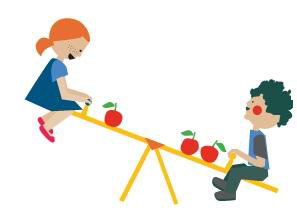To educate is to use our knowledge about our children, especially their shared interest in learning or discovering what’s around us. By enjoying fun moments with our children, we’ll learn much more than grammar rules or theories; we’ll also teach emotional self-regulation and allow the child to explore a wide range of social rules (e.g. learning be a good winner and a good loser, managing emotions in relation to performance, learning to wait, stop and slow down, manageing impulsivity, learning to listen to each other … etc.. ). Play leads children to create challenges and to challenge themselves.
To take full advantage of these moments, here are a few rules to follow.
Turns: In communication and play with peers, your child will learn to share time and allow others to speak and offer ideas. Using turns as a model or as an alternate resort, you may choose the games to play or follow the child into his world. Collaborative play is a good way to get the child to explore different areas of learning and create great opportunities for incidental teaching through play.
Deductions: Your child can learn to make his own deductions. Before teaching the child a particular concept in a game, it’s interesting to understand the child’s logic and how he constructs his reasoning. Let him explore this magnificent world of imagination; don’t always see an opportunity to teach THE right concept. We mustn’t forget that these are children.
Changing the Rules: A board game can be fun to play the traditional way the first time around. After that, when you want to play another game, why not add something a little whacky to it.
Attention Span: Toddlers’ attention spans are often short. Remember to have fun. Don’t make any requirements. Follow the interests and the opportunity to communicate.
Listen: Through symbolic play, a world is created of learning to recognize and name emotions. When children live a second or other life, they reproduce and incorporate it into their own lives (eg, a child argues with a doll and uses his judgment connected to his own perception). It becomes a way to express their emotions or to construct unspeakable social schemes (e.g. I want my mother to disappear so I can marry my father).
Some Play Ideas to Explore
Why play a game that comes in a box? Take advantage of this opportunity to develop new ideas and create a game with your child. Try one of 3 mystery items (summary activities presented in the context of Play training – have fun and learn). Ask your child to pick three objects of his choice. Then ask him what they could be used for. Create a process leading to several skills such as functional independence and anticipation.
Come outside and play now! Discover insects with a magnifying glass, discover the world by crawling, or let yourself be carried away by the music. Outside, everything is permitted. My father often told me:” a dirty child is a child who had fun!” And it’s true. Let him explore the garden or do strange things. The child must be able to discover the limits of the imagination, to understand the nuances of the world. Offer alternatives related to cartoons they may have seen. Today, we are in a ballerina’s shoes, or a dragon explorer.
Why not stay in shape? Revisit a childhood classic by creating outdoor running engines or indoor ones: a beautiful journey touring the house, one going around the sofa from under the table. Climb Mount Everest (stairs), and hide from goblins (under the covers), jump over rivers … etc.. Become jugglers, tightrope walkers, circus acrobats. It’s an afternoon of fun, without a formal exercise program.
Discover sounds – zing, zing, zing. Is it the parade band or the orchestra? Whether through playing musical instruments or using your own voice, your child will have fun for sure. By stimulating the development of language, organizing oral-motor concepts for acute and severe problems, you will enjoy creating this enchanted world where anything is possible.
Taking time to play with a child is investing in a relationship. Building this close relationship is the basis for which all future relationships develop. But above all, it’s through these snippets of time and these little touches that can help our children develop a positive sense of self and confidence in his abilities. Too often we forget how to have fun and yet, once engaged, the world allows us to relax. Believe me, you’ll also be captivated your child!
Mélanie Deveault, ASD Consultant & Language Specialist-cf.grandir.autrement@gmail.com



Leave A Comment